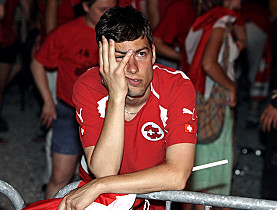“We cannot lose this match”

Switzerland kicks off Euro 2008 on Saturday in Basel by taking on the Czech Republic in a high-pressure encounter that could prove to be decisive.
The identity of Switzerland’s adversary for this opening match has been known since December and the famous draw at the Lucerne Culture and Convention Centre, designed by French architect Jean Nouvel.
Since then, observers have been pontificating on the lessons to learn from friendly matches, the selection of the 23 team players, how to cope with the pressure of the opening match, the need for victory or the obligation to avoid defeat at all costs, the injuries, the impact of coach Köbi Kuhn…
“Preparation is good, for a while … but we really want to get going,” Swiss midfielder Gelson Fernandes told swissinfo at the Swiss team’s hotel in Feusisberg.
And what about the pressure of this opening match? “The team is ready,” the Manchester City player said. “All the players are used to playing high-level matches in front of big crowds. The pressure is left to supporters and journalists. On Saturday, it will just be a question of playing football well.”
Stephan Lichtsteiner, defender for Lille and Switzerland who has been courted for some time by Real Madrid, added: “Of course there is a bit of the unknown for players like me. But we are really happy to be playing. And the pleasure supersedes the pressure. In any case, if you are too highly strung, you can blow your match.”
An “exceptional” match
However, behind this reassuring talk, behind the desire to play and the notion of pleasure, the pressure of the opener remains enormous.
“Playing this opening match is an honour, because it is quite rare for Switzerland to organise such an event,” the former international player and coach Umberto Barberis told swissinfo. “But we cannot lose this match and that places a very great pressure on the shoulders of the players.”
Barberis, a consultant for swissinfo during Euro 2008, regards the opening match as a window.
“It’s the most televised encounter and the most watched together with the final. Everyone has an opinion about the host country – which qualified automatically – and wants to know if the organisation is going to meet their expectations. In addition, the country that hosts the tournament needs to stay in the competition for as long as possible.”
Cech, Baros, Koller and … Brückner
Against the Czech Republic on Saturday, Switzerland will therefore try its best to launch the tournament by imposing and reaping three very precious points straight away. However, its opponent is far from a newcomer.
It’s true that several team pillars such as Nedved, Smicer or Poborsky have jumped ship and the captain Tomas Rosicky (a colleague of Johan Djourou and Philippe Senderos at Arsenal) is hurt. But the team, coached by the crafty Karel Brückner, has solid foundations.
Tactically and collectively, the team can count on the world-class keeper Petr Cech (Chelsea) and attackers such as the 2.02m Jan Koller (Nuremberg) and Milan Baros (Portsmouth).
Runner-up at Euro 1996 and semifinalists in Portugal four years ago, the Czech Republic finished first in their qualifying group ahead of Germany.
The bookmakers make the Czechs a very slight favourite, with a draw equally likely.
“This team is very compact and relies on a good, well-disposed and practically impenetrable defence. Moreover, in Jan Koller it has a very talented attacker capable of making the different at any moment in the match,” Barberis said.
It’s perhaps in mid-field that the team is a little weaker… but that remains to be seen. The answer will come at on Saturday evening.
swissinfo, Mathias Froidevaux
The central European country of the Czech Republic has ten million inhabitants and became independent after the break-up of Czechoslovakia in 1993.
It was runner-up in the 1996 European Championships in England after being defeated 2-1 against Germany during extra time, did not qualify for the 2000 tournament and was eliminated in the semifinal four years ago by the Greeks.
As Czechoslovakia, the Czech players won the 1976 Euro tournament after beating Germany in the final penalty shoot-out and thanks notably to a “flick” kick by Antonin Panenka.

In compliance with the JTI standards
More: SWI swissinfo.ch certified by the Journalism Trust Initiative











You can find an overview of ongoing debates with our journalists here . Please join us!
If you want to start a conversation about a topic raised in this article or want to report factual errors, email us at english@swissinfo.ch.